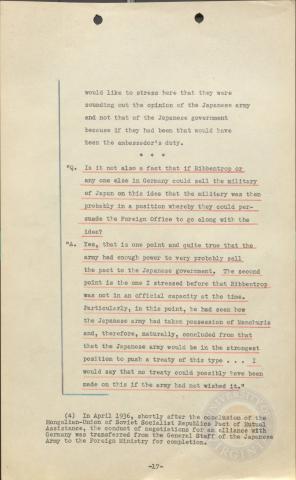
Page 17
| Parent | Collaboration Between Japan, Germany and Italy - Volume II |
|---|---|
| Date | 25 November 1941 |
| Language | English |
| Collection | Tavenner Papers & IMTFE Official Records |
| Box | Box 15 |
| Folder | Japan, Germany, Italy Collaboration Vol 2 |
| Repository | University of Virginia Law Library |
would like to stress here that they were sounding out the opinion of the Japanese army and not that of the Japanese government because if they had been that would have
been the ambassador's duty.
* # *
WQ* Is it not also a fact that if Ribbentrop or
any one else in Germany could sell the military of Japan on this idea that the military was then probably in a position whereby they could per- suade^the Foreign Office to go along with the idea?
MA. Yes, that is one point and quite true that the army had enough power to very probably sell the pact to the Japanese government. The second point is the one I stressed before that Bibbentrop was not In an official capacity at the time. Particularly, in this point, he had seen how the Japanese army had taken possession of Manchuria and, therefore, naturally, concluded from that that the Japanese army would be in the strongest position to push a treaty of this type . • . I would say that no treaty could possibly have been made on this if the army had not wished it."
(4) In April 1936, shortly after the conclusion of the Mongolian-Union of Soviet Socialist Republics Pact of Mutual Assistance, the conduct of negotiations for an alliance with Germany was transferred from the General Staff of the Japanese Army to the Foreign Ministry for completion.
